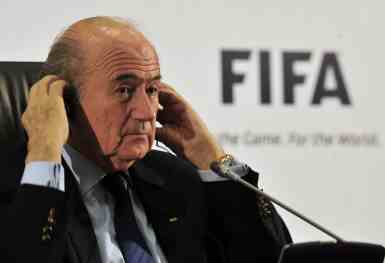Why does God let them get away with it?
 Mark Fairweather-Tall wonders why God allows apparent injustices to prevail
Mark Fairweather-Tall wonders why God allows apparent injustices to prevail
It was Harold Wilson who famously said, “A week is a long time in politics”. It seems this is true in the political world of football as well.
On Friday 29th May, Sepp Blatter was re-elected, amidst much controversy, for a fifth term as President of FIFA. Earlier in the week seven senior FIFA officials were arrested as a part of the investigation by US prosecutors who alleged that bribery and corruption had been part of the culture of FIFA for many years. There were calls for Blatter to step down but he stood firm and won the election. Afterwards he said: “For the next four years I will be in command of this boat called FIFA and we will bring it back to shore.”
Four days later FIFA called a news conference where Blatter announced he was resigning because he did not feel he had a “mandate from the entire world of football.” Those who a few days earlier had been declaring disappointment at a ‘dark day’ for football were now able to look to the future with the hope that things would change. Yes, a week can be a long time in the political world of football.
And in this news story we seem to have an echo of what is so often a reality of life: Frustration at the way things are when justice seems to be absent and this means there are those getting away with things they shouldn’t.
This is by no means a new problem, indeed it is one we meet in the Bible. In Psalm 73 we have an honest, heartfelt expression of living in the world where those who don’t deserve it seem to prosper. It is written by Asaph, a Levite who was one of the leaders of David’s choir.
Whilst he starts by affirming God’s goodness: “Truly God is good to Israel, to those whose hearts are pure…” He has clearly struggled with the issue of living in a broken world and keeping his faith: “But as for me, I almost lost my footing. My feet were slipping and I was almost gone…” v2. He then reveals what has put him in this perilous place: “For I envied the proud when I saw them prosper despite their wickedness. They seem to live such painless lives; their bodies are so healthy and strong. They don’t have troubles like other people, they’re not plagued with problems like other people.” V2-5.
In other words he was losing hope in justice and facing the reality that doing the right thing can make life harder: “Did I keep my heart pure for nothing? Did I keep myself innocent for no reason? I get nothing but trouble all day long; every morning brings me pain.” V13-14. This is a very human reaction to a far from uncommon reality that can so easily be a part of our experience: life is unfair because people don’t seem to get what they deserve.
In such a situation we might ask if things can change. In a world where so often we see things that aren’t right we need to be able to anticipate that things can and will be different at some point. Hope is so important if the future is to be faced positively. Is there any hope?
The Psalmist discovers that there is, but where does this hope come from? Certainly there is no indication that suddenly his position becomes easier or that the ‘arrogant’ and ‘wicked’ are suddenly struggling. However, he has a change in perspective: “If I had spoken out like that, I would have betrayed your children. When I tried to understand all this, it troubled me deeply till I went into your sanctuary, O God, and I finally understood the destiny of the wicked.” (v15-17). How does that change of perspective come about and what can we learn from it?
The first step to his change in perspective comes when he realises that his response affects other people. If he had lost his footing and slipped, it would have hurt others. When things in the world don’t seem fair, if we give in and wallow in self-pity then we damage not only ourselves but also others -including the ones we love most.
The Psalmist gets to the point when he realises the depth of his attitude problem: “When my heart was grieved and my spirit embittered, I was senseless and ignorant; I was a brute beast before you.” (v21-22). This step is not enough to give him hope, but it does cause him to take action.
His response to not wanting to hurt others is that he seeks understanding. However, he acknowledged that was a difficult, if not impossible, task. There was no way he could understand all the reasons why injustice seems to be rewarded.
But then something happens – as he is seeking understanding he goes to the sanctuary. This is a place of worship where God’s presence and rule is acknowledged and praised. It is in such a place that God reveals himself and we begin to see the world from God’s perspective not simply our human one. Here there is no need to hide feelings or be anything less than completely honest before God. It is in this moment that a change of perspective begins to happen because in worship where God’s rule is accepted and welcomed, and where we come with complete honesty before the Lord, the Holy Spirit can bring change and hope.
As a result of this Asaph can see the bigger picture and that ultimately the destiny of the wicked is an end to their prosperity. This is in strong contrast to Asaph’s position before God: “Yet I am always with you; you hold me by my right hand. You guide me with your counsel and afterwards you will take me into glory.” (v23-24).
In the light of Jesus we can see this as a promise of our future security. Whatever happens in this world we have the promise that one day things will be put right. Suddenly there is hope in spite of injustice in the world. The world may still be the same but Asaph isn’t. He has moved from the one who nearly lost his footing to the point where he closes the Psalm by saying: “But as for me, it is good to be near God. I have made the Sovereign Lord my refuge. I will tell of all your deeds.” (v28).
And here is a challenge for us: In a world of injustice, to seek to have a Godly perspective and ultimately to tell of His deeds. In the telling of the deeds of God we seek to share something of God’s passion for justice in a broken world. This not only can bring hope but also change.
I love the story of a coal mouse and a wild dove. It goes like this:
Tell me the weight of a snowflake", a coal-mouse asked a wild dove. "Nothing more than nothing", came the answer. "In that case, I must tell you a marvellous story," the coal-mouse said.
"I sat on the branch of a fir, close to its trunk, when it began to snow - not heavily, not a raging blizzard - no, just like in a dream, without a sound and without any violence. Since I did not have anything better to do, I counted the snowflakes settling on the twigs and needles of my branch. Their number was exactly 3,741,952. When the 3,741,953rd dropped onto the branch - nothing more than nothing, as you say - the branch broke off." Having said that, the coal-mouse flew away.
The dove, an authority on this since the time of Noah, thought about the story for a while, and finally said to herself, "Perhaps there is only one person's voice lacking for justice to come to the world."
Who knows which voice it was that led Sepp Blatter to decide he couldn’t carry on? Who knows what difference we might make with our small voice speaking out for justice? Things can change and there is hope.
Image is courtesy of Marcello Casal Jr via Wikimedia Commons
(http://creativecommons.org/licenses/by/3.0/br/deed.en)

Rev Mark Fairweather Tall is a Minister of Norwich Central Baptist Church.
The views carried here are those of the author, not of Network Norwich and Norfolk, and are intended to stimulate constructive debate between website users.
We welcome your thoughts and comments, posted below, upon the ideas expressed here.
Click here to read our forum and comment posting guidelines.